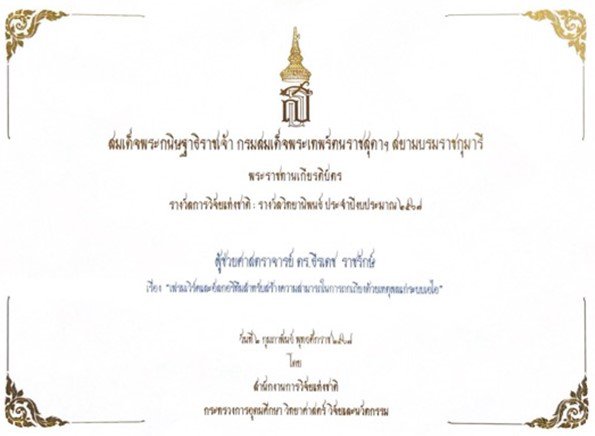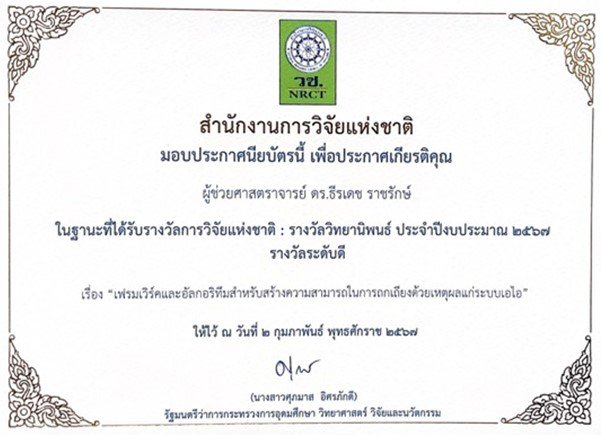Senior Lecturer RACHARAK , Computing Science Research Area, received the 2024 NRCT National Research Award (Dissertation Award) from the NRCT.
Senior Lecturer RACHARAK, Teeradaj, Computing Science Research Area, received the 2024 NRCT National Research Award (Dissertation Award) from the National Research Council of Thailand (NRCT).
NRCT supports and honors Thai researchers who contribute to advancement of science and social scientific research that can benefit the public. At the prestigious "Thai Inventors Day 2024" event held in Bangkok, Thailand from February 2-6, the winners of the prestigious NRCT National Research Awards for 2024 were honored at a ceremony where they received their certificates from Her Royal Highness Princess Maha Chakri Sirindhorn of Thailand and the NRCT. NRCT granted 178 awards of the year 2024, including 9 outstanding researcher awards, 58 research awards, 51 dissertation awards, and 60 invention awards. Senior Lecturer RACHARAK received the award for his dissertation, which he presented while a doctoral student at Sirindhorn International Institute of Technology, Thammasat University, Thailand, under the supervision of Assistant Professor Nguyen Duy Hung.
■Date Awarded
February 2, 2024
■Title
Structured Analogical Argumentation: Frameworks and Algorithms
■Authors
Racharak, Teeradaj
■Abstract
Analogical reasoning is a complex process based on a comparison between two pairs of concepts and states of affairs (aka. the source and the target) for characterizing certain features from one to another. Arguments which employ this process to support their claims are called analogical arguments. Our goals are to study the structure and the computation for their defeasibility in light of the argumentation theory. We outline the results of our study as comprising two parts in the following.
First, analogical reasoning involves in understanding the notion of similarity. To address this problem, we first take a look into the literature of similarity models. The most basic (but useful) one was introduced by (Tversky, 1977). In Tversky's model, an object is considered as a set of features. Then, the similarity of two objects is measured by the relationship between a number of common features and a number of different features. Nonetheless, not every feature needs to be cited in analogical arguments, the studies in (Hesse, 1965; Waller, 2001; Weinreb, 2016) reported that features used by the comparison should be 'relevant' for characterizing certain features from one to another. As part of the study, we formally investigate the characteristics of a 'similarity notion' for analogical arguments in this dissertation. Though our similarity models are posed in a general structure, our running examples are shown regarding the description logic formalism.
Second, analogical reasoning involves in understanding the structure of analogical arguments and computing their nature of defeasibility. These problems are indeed related to the study of structured argumentation and the acceptability of analogical arguments. As their results, we formally introduce a general framework in structured argumentation called assumption-based argumentation with predicate similarity ABA(p) framework. This framework can be seen as an extension of assumption-based argumentation framework (ABA), in which not only assumptions can be used but also similarity of predicates (w.r.t. by the proposed similarity notion) are used to support a claim. ABA(p) labels each argument tree with an analogical degree and different ways to aggregate numerical values are studied toward gullible/skeptical characteristics in agent reasoning. The acceptability of analogical arguments is evaluated w.r.t. Dung-styled semantics.
Finally, we demonstrate how our study can benefit the area of service science. Realistic examples are analyzed and a diverse range of applications is discussed.
■Comment
It is a great honor for me to receive the awards from Her Royal Highness Princess Maha Chakri Sirindhorn of Thailand and the National Research Council. The bestowed award certificates and award plate give me a great motivation to do better research that can benefit the public in future.

Award certificate bestowed by Her Royal Highness
Princess Maha Chakri Sirindhorn of Thailand

Award certificate bestowed by the National
Research Council of Thailand
March 19, 2024
